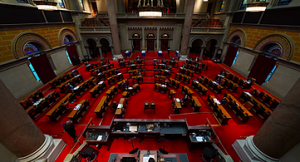Original article written by Reena Amin for Chalkbeat
Today, January 6, state lawmakers in New York are preparing to start a new legislative session with a major focus on money and the state budget. While school funding has always been an issue in Albany, this year local governments are figuring our how to recover from an unprecedented disruption to in-person education while facing a financial crisis. As the state faces a $60 billion budget gap over the next four years, Gov. Andrew Cuomo has warned that school districts could see a 20% cut if more federal pandemic recovery dollars don’t come in and even with more federal money, the state will still likely have to raise taxes.
These looming cuts mean local districts may have to slash services or programs for their students or lay off staff while at the same time, children’s needs are increasing as remote learning has exacerbated already existing inequities. In all, the Board of Regents want to raise overall aid by $1 billion compared to current funding — a tall order given the state’s overall financial situation. When it comes to increasing taxes, some legislators are pushing to raise taxes on the wealthy in order to fund education. While the Cuomo administration predicts the need to raise taxes,it has opposed raising them on the ultra wealthy alone, saying that it would cause those taxpayers, who pay for half of the state’s tax liability, to flock to places outside of New York. However, some economists argue that those individuals live in New York City out of choice and cutting government services could be a reason to leave.
In another important topic around funding, state lawmakers are looking for solutions to address the lack of reliable internet access that has left thousands of students behind, particularly those from low-income families and students in homeless shelters. A bill to expand broadband access, introduced by Rochester Democrat and Senate education committee chair Sen. Shelley Mayer in November, would charge an assessment to telecommunications companies to cover or partially subsidize broadband access for all K-12 students across New York. Furthermore, local advocates are looking for more transparency on how students are currently faring academically, “Knowing which students are not getting the support and services they need is essential to making sure we have the resources, the technical support, and the urgency to be meeting all the needs of students right now,” said Ian Rosenblum, executive director of Education Trust-New York. Other important topics to be addressed during the legislative session include mayoral control over schools reopening and closing and changing the specialized high schools admissions test to be more equitable towards Black and Hispanic students.
To read the full article, CLICK HERE

